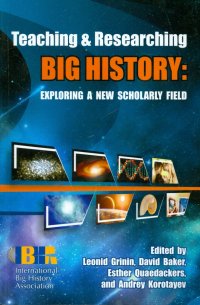According to the working definition of the International Big History Association. 'Big History seeks to understand the integrated history of the Cosmos, Earth, Life and Humanity, using the best available empirical evidence and scholarly methods'. In recent years Big History has been developing very fast indeed. Big History courses are taught in the schools and universities of several dozen countries. Hundreds of researchers are involved in studying and teaching Big History. The unique approach of Big History, the interdisciplinary genre of history that deals with the grand narrative of 13.8 billion years, has opened up a vast amount of research agendas. Big History brings together constantly updated information from the scientific disciplines and merges it with the contemplative realms of philosophy and the humanities. It also provides a connection between the past, present, and future. Big History is a colossal and extremely heterogeneous field of research encompassing all the forms of existence and all timescales. Unsurprisingly, Big History may be presented in very different aspects and facets. In this volume the Big History is presented and discussed in three different ways. In its first part. Big History is explored in terms of methodology, theories of knowledge, as well as showcasing the personal approach of scholars to Big History. The second section comprises such articles that could clarify Big History's main trends and laws. The third part of this book explores the nature of teaching Big History as well as profiling a number of educational methods.This volume will be useful both for those who study interdisciplinary macroproblems and for specialists working in focused directions, as well as for those who are interested in evolutionary issues of Astrophysics, Geology, Biology, History, Anthropology, Linguistics and other areas of study. Это и многое другое вы найдете в книге Teaching and Researching Big History: Exploring a New Scholarly Field (David Christian, David Baker, Leonid E. Grinin)
Teaching and Researching Big History: Exploring a New Scholarly Field David Baker, David Christian, Leonid E. Grinin
Подробная информация о книге «Teaching and Researching Big History: Exploring a New Scholarly Field David Baker, David Christian, Leonid E. Grinin». Сайт не предоставляет возможности читать онлайн или скачать бесплатно книгу «Teaching and Researching Big History: Exploring a New Scholarly Field David Baker, David Christian, Leonid E. Grinin»
